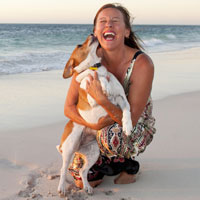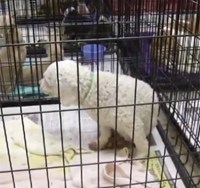I work at an animal shelter, so when my sister-in-law, Lana, called me with the announcement she was getting a dog, I was thrilled to begin matchmaking. But then she dropped a bomb — they had already found a Maltese–Yorkie mix for sale in Missouri.
As the conversation went on, the red flags popped up. The “breeder” was licensed to sell in volume, they were willing to ship worldwide without having a contract signed, they were mixing dog breeds, the puppy’s parents had no health clearances, and the puppy was nearly four months old and had never seen a veterinarian.
My own family member was about to unwittingly buy a dog from a puppy mill.
I’ve worked in animal welfare for more than a decade, so it was too easy to forget others might not know how to find a pet from an ethical source. Lana had a list of requirements that would work for her family: It had to be very small, low-shedding, low-allergy, female, and young. She truly did not know about the horrors of puppy mills, so when she could not find a suitable match in her local shelter, she found what seemed to be an ideal candidate on the web.
I am not disillusioned to the point that I think tiny, curly-haired, kid-friendly puppies walk into shelters every day. And I do not think wanting a puppy with a certain look and temperament makes you a bad person. I know purebred dogs can be found in shelters, and I know nearly 4 million animals each year are killed in shelters because of a lack of homes, but I truly believe that while responsible breeders are rare, they do exist and their impact on the shelter system is minimal. (People selling puppies in bulk on the internet or in pet stores are a different story.)
I urged Lana to look at the website of a family who I consider to be the gold standard of responsible breeders to help her understand the difference. Gayle Watkins and Andy Chmar of Gaylan’s Goldens have been involved with Golden Retrievers for over 30 years and go out of their way to raise the puppies with a focus on health and socialization. If all breeders (and mills for that matter) took the care this family does in raising puppies, then shelters would not be so overcrowded. You are unlikely to see a Gaylan’s dog or its offspring in a shelter, not only because the family provides ongoing support to the buyers, but because the dogs have been exceptionally well-socialized, the buyers well-screened, and those who are not of show or performance quality have been spayed or neutered. None of this could be said for an irresponsibly bred dog.
After tackling some sad faces at the breakfast table, Lana was able to convince the family the right pup was worth the wait. They understood that a good breeder or a shelter were the only responsible options and were not set on a purebred dog. Eight days later, they adopted Curly Sue, a Poodle–Yorkie mix puppy who was healthy, friendly, and already spayed.
When I first talked to Lana, I forgot people sometimes just don’t know the facts, and I easily could have lost this opportunity to save a shelter pup’s life in my own frustration. Please don’t make the same mistake. Education is as much a solution to the pet overpopulation problem as adoption. And when we combine those two factors, we cannot help but save lives.



